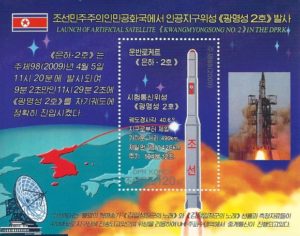
How Will We Manage When They Know They Can Hit Us?
North Korea’s July 4 launch of an ICBM pushes us to a full reckoning with our motives, values, and national existence. In columnist Charles Krauthammer’s words, for “25 years and five administrations, we have kicked the North Korean can down the road. We are now out of road.” North Korea has put enough “facts on the ground” to present us with a stark choice, between military action or acquiescence to their intercontinental nuclear capacity. UN Ambassador Nikki Haley’s explicit public reference to U.S. military power suggests that U.S. policy makers do not see other options.
Our influence in the world and our security have diminished. We must note that every administration since 1994 paved the road to today; faults and errors are bipartisan and often very human. Regardless, events and arguments will raise questions that portend even greater dangers. We must prepare for a long game, and start by reorienting our foreign policy to America’s basic precepts.
Our reaction to the July 4 test implies that our highest priority is to avoid the threat of nuclear attack. But North Korea will likely gain their nuclear capable ICBMs. When they do, will we be comforted that a nuclear attack on the US would be suicide? What if they demand concessions from South Korea or Japan, thinking that we are deterred from striking them? If we only brandish our own military power now that they can hit us, how confident will our allies be in our protection in the future?
North Korea’s operating style will surely confront us with those questions sooner rather than later. The wrong answers will trigger a cascade of losses and doubts. If we show our security commitments to be malleable, allies will disappear. Second, such wavering calls America’s motives into question. Our rhetoric, to protect peace and stability, promote prosperity, and encourage democracy, will look cavalier, or like a cynical cover for raw power. Third, if a nation founded on freedom’s principles will not take risks for others’ freedom, perhaps no one really cares about freedom. Perhaps America’s founding principles are delusional. Fourth, our holding of those principles mark our national identity. If their “self evident” truth is discredited, so will be America’s legitimacy.
The administration is fashioning responses to the latest launches, and the commentariat is abuzz with attempts to find new angles. All acknowledge that military action will trigger disastrous counterstrikes, and no one sees Kim Jong Un making compromises. None can avoid ex-diplomat Evans Revere’s cogently point, that every option for policy toward North Korea leads to outcomes that are beyond bad. He also notes that any policy will demand skillful diplomacy with many countries, which may not work anyway. No policy today will avoid the ugly questions, which could discredit America dangerously.
America must turn its focus to reversing any cascade of doubts, into one of affirmation of our nature and goals. Only from affirmation and clear resolve can we build leverage over North Korea or other regimes of its ilk, and it will need time to take effect. Getting to that point requires that we play the long game, with a clear and firm focus.
America’s true bottom line has always been validation of our founding creed, of unalienable rights and government serving to secure them. If we re-voice our policy goals in these terms, we exhibit our true motives, and address the worst possibility of the dystopian cascade.
Our creed need not alienate us from what Freedom House calls “partly free” regimes. Some afford their people more welfare and freedom than others; some are raising those levels and some lowering them. China, though still a one-party state, has a government that knows its public obligations and aims to better the condition of its citizens. We will not be friends as we are with Denmark, but we share some values, as well as common interests. We can see degrees of compatibility,with our ethos as the yardstick. Using it to calibrate our relationships, we assert our values. Our global scope for diplomatic collaboration will expand.
A growing understanding of our goals will tip countries like China to focus, more and more over time, on the compatibilities with us. North Korea will stand out, more and more over time, as an abhorrent outlier, any interest in supporting them less and less worth the cost.
While we should build a new policy base regardless of their threat, we could then point out to North Korea how we adapt to degrees of friendship and enmity — and their weapons, belligerence, and inhumanity put them at the bottom of the ladder. If they feel that Muammar Gaddafi’s overthrow proves their need for a nuclear arsenal, they can be reminded of an arsenal’s failure to save the Soviet Union, and we view their regime as more reprehensible than the Soviets’.
The world ultimately shares our values, which are genuinely the root of our animosity to North Korea. If America aligns our policies by that priority, more will see North Korea as we do – confronting them with a choice between better conduct and the Soviets’ fate. More importantly, we restore our global influence, in the name of rights and freedom. But it will take time. We should start as soon as possible.